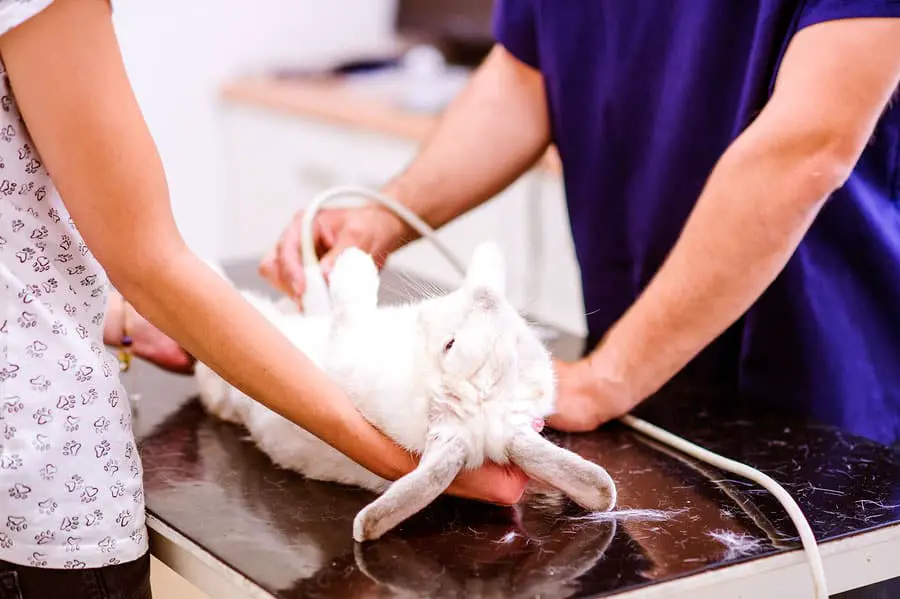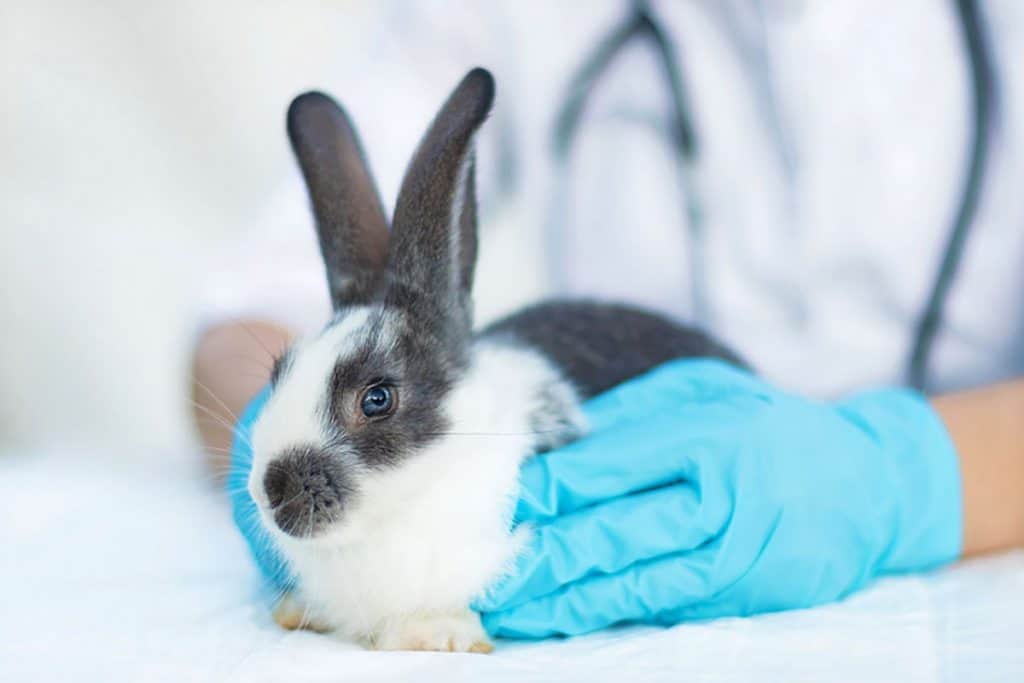Disclosure: We may earn money or products from the companies mentioned in this post.
Many owners of pet bunnies ask me whether they should be spaying and neutering rabbits. As a small animal veterinarian with 15 years of experience, I enjoy educating clients on the care and keeping of their rabbits so they can live longer, healthier lives. In this article, I’m going to share my years of veterinary experience regarding spaying or neutering your bunny.
We are going to start by talking about spaying rabbits and then move on to neutering rabbits.
But first, let’s define what we mean by spaying or neutering.
Both spaying and neutering refer to a medical procedure that removes the reproductive organs of a rabbit so they can no longer have babies. Spaying refers to the surgery performed on female rabbits (does) and neutering refers to the surgery performed on male rabbits (bucks).
To be clear, the terms “spaying” and “neutering” can be used to refer to the procedure applied to any mammal, but for the purpose of this article, we’re focusing only on rabbits.
In the sections below, we’ll go into much more detail about each specific procedure.
“Fixing” is the generic term for spaying or neutering an animal. For example, you might here people say “I had my rabbit fixed yesturday.” to indicate they they had their bunny either spayed or neutered, depending upon their sex.
Having A Rabbit Spayed
First, let’s be clear that only female rabbits are spayed. Everything in this section of this article is only about having your female rabbit fixed. We’ll go into the procedure for male rabbits later.
Benefits of Spaying A Rabbit
The main reason most owners spay their rabbits is to avoid pregnancies. Not only is pregnancy a potentially dangerous experience for the mother, rabbits typically have 5-8 kits per litter, but they may have as many as 14. It can be a daunting task to find good homes for that many babies.
Additionally, there are numerous other reasons to spay a rabbit. The benefits of spaying are both health-related as well as behavioral.
The main health benefit of spaying a rabbit is reducing the likelihood of reproductive system cancers. Mammary (breast), uterine, and ovarian cancers are very common in rabbits and spaying will significantly reduce, if not eliminate, the risk of these cancers for a pet rabbit.
Spaying a female rabbit not only drastically reduces reproductive cancer risks but also eliminates the risk of life-threatening uterine infections (pyometra).
Once spayed, rabbits are less likely to exhibit behaviors that most owners find distressing such as humping, urine marking, and showing aggression.
Spayed female rabbits tend to be more affectionate and easier to handle.
The spayed female is kept from experiencing pseudopregnancies which can lead to medical issues and aggression.
The Rabbit Spaying Procedure
Prior to the surgery, the rabbit should receive a complete physical exam from the veterinarian. This exam will assess the overall general health of the bunny, listen for any respiratory issues, evaluate the heart, and bring any indicators of anesthetic risk to the doctor’s attention.
Pre-surgical blood work should be drawn at this time to assess the rabbit’s organ health.
Prior to surgery, the veterinarian will provide the owner with all necessary instructions. Rabbits should not be fasted (withheld from food) prior to surgery as humans, and many other animals (such as cats and dogs) are the night before the surgery.
After anesthesia starts and the rabbit is unconscious, hair will be clipped from the abdomen, and the area will be sterilely prepared. Equipment will be used throughout the surgery to monitor the rabbit’s vitals, including pulse oximetry, heart rate, blood pressure, respiratory rate, and EKG.
An incision will be made into the abdomen, below the belly button. The surgeon will locate and remove the rabbit’s ovaries and uterus and tie off the blood supply to these organs. The incision will be closed with two to three layers of sutures.
We’ll cover post-surgical care in a bit.

Having A Rabbit Neutered
Let’s start by clearly stating that neutering is a medical procedure that is only performed on males which are also called bucks.
Benefits of Neutering a Rabbit
The most obvious reason to neuter a male rabbit is to prevent unwanted pregnancies. This is only necessary if your male rabbit will be spending time with a female rabbit. Even brothers and sisters need to be fixed before they reach sexual maturity to avoid pregnancy.
As in females, there are both behavioral and health benefits to neutering a male bunny.
Neutering a male rabbit will eliminate the risk of testicular cancer. Additionally, a neutered rabbit will exhibit fewer unwanted behaviors such as humping, urine marking, and aggressive behaviors.
Neutering will reduce the risk of reproductive tract cancers. Testicular cancer risk will be eliminated, and other reproductive tract cancers, such as prostate cancer, will be significantly reduced.
A neutered male will be more affectionate and calmer, making him a better pet. These rabbits tend to have less aggression and other unwanted behaviors.
Neutered males are easier to litter box train and are more consistent with their litter box use.
The Rabbit Neutering Procedure
Just as with a female rabbit, male rabbits should receive a thorough physical exam and blood work prior to anesthesia.
Once unconscious, hair will be clipped from the scrotum and abdomen, and the surgical site will be sterilely prepped. Anesthetic monitoring equipment will be used to monitor the rabbit’s breathing, heart rate, oxygen saturation, blood pressure, and EKG.
An incision will be made in the scrotum and the testicles will be removed. The incision will be closed with sutures and skin glue.
Post Rabbit Spaying And Neutering Care
The rabbit will be monitored in a recovery suite until they have recovered from the anesthetic and are fully awake. Pain medications will be administered, and the rabbit’s vitals will be constantly assessed.
When the rabbit is ready to go home, a nurse will provide and explain post-operative instructions for home care.
The rabbit should be placed in a clean and quiet area once home. All pain and other prescribed medications must be given on time. Eating and drinking should be encouraged, but never forced.
The rabbit should resume their normal diet. They may eat less than usual for the first 12-24 hours, but normal eating should resume promptly.
The incision should be kept clean and dry and not covered with bandages, nor should any topical creams or ointments be applied. Daily inspection of the incision should be performed to catch any early signs of infection (pus, redness, swelling). If the rabbit licks or chews at their sutures, your veterinarian should be contacted for advice.
If sutures are present, they will need to be removed by your veterinarian in about ten days.

Rabbit Spaying and Neutering FAQ
In this section, I’ve answered many rabbit owners’ frequently asked questions regarding spaying and neutering pet bunnies. If you have additional questions, please leave them in the comments below and I’ll try to get them answered soon. ~ Dr. Whittenburg
1. How old should a rabbit be to be spayed or neutered?
The age a rabbit is spayed or neutered is at the discretion of the veterinarian performing the surgery, but most recommend surgery between the ages of 4-6 months for a female and 3-5 months for a male.
2. Can a Rabbit Be Too Old To Spay or Neuter?
There is no age where a rabbit becomes too old to be fixed, either by being spayed or neutered. The only reason not to proceed with a needed surgery would be if the rabbit had a medical condition that its veterinarian felt made the procedure too risky.
As the saying goes, “old age isn’t a disease.”
3. What is the survival rate of bunnies that are spayed or neutered?
The survival rate of rabbits being spayed or neutered has been reported to be 99.3%. Though no medical or surgical procedure is entirely without risk, having your bunny fixed is a relatively safe procedure.
4. Should a rabbit be fasted prior to being spayed or neutered?
Rabbits should not be fasted prior to being spayed or neutered. While humans and other animals are often denied food prior to surgery, due to anatomical differences in the gastrointestinal systems of rabbits, rabbits should not be fasted prior to surgery.
5. How long does a rabbit spay or neuter surgery last?
The length of a spay or neuter procedure is highly dependent on the skill of the surgeon performing the procedure. Spays are much more complicated procedures than neuters, involve opening the abdominal cavity and this procedure takes considerably longer than neuters.
6. How long does a rabbit take to recover from anesthesia?
In general, most rabbits are fully awake within an hour of the procedure. However, they may be “groggy” or slightly sedated for up to 12 hours as their bodies metabolize the anesthetic drugs. A rabbit’s recovery from anesthesia can depend on many factors, such as length of surgery time and depth of anesthesia.
7. Do rabbits need pain medications after being spayed or neutered?
Of course rabbits need pain medications after being spayed or neutered! Spays and neuters are major surgical procedures. Just as we would never subject a human to such a procedure with no pain medications afterward, rabbits also need proper pain management.
8. How long will a rabbit stay at the vet after a spay or neuter?
The time a rabbit stays at the vet after a spay or neuter may vary from hospital to hospital, but most veterinarians will discharge the bunny the afternoon of the procedure once they are stable and awake enough to go home.
9. How are rabbits’ incisions checked at home?
To check a rabbit’s spaying or neutering incision at home, the rabbit should be gently and calmly held in a position that allows for visualization of the incision, at least once daily, for the first week after surgery. Any signs of pus, redness, or swelling should be reported to the rabbit’s veterinarian.
10. Do a rabbit’s incision and stitches need to be cleaned?
No, the rabbit’s incision does not need to be cleaned. The incision needs to be kept clean and dry. No bandage covering or ointments should be applied.
11. Do rabbits wear “cones” after surgery?
In most cases, an Elizabethan collar, or “cone,” is not necessary for rabbits after surgery. The surgeon will employ gentle tissue handling techniques and buried sutures that will minimize the likelihood that the rabbit will lick the incision. However, if the rabbit does lick or chew at the surgery site, a “cone” can be utilized.
If you don’t know what a cone is, you can see one on Amazon.
12. What if a rabbit won’t eat after surgery?
Upon returning home after surgery, the rabbit should be put in a clean cage, in a quiet place that offers privacy. Plenty of fresh hay and fresh vegetables, as well as pellets, should be provided.
After being spayed or neutered your rabbit may not have a great appetite at first but should begin eating in the first few days. If the rabbit has not eaten anything after 24-36 hours, the veterinarian should be notified.
13. Is diarrhea common in a rabbit after surgery?
A healthy rabbit may experience some soft stools after being spayed or neutered. This soft stool should clear up within a few days as the bunny settles back in and begins eating. If the stool is extremely loose or does not firm up in a few days, a veterinarian should be consulted.
14. How much does it cost to have a rabbit spayed or neutered?
The cost to have a rabbit spayed or neutered varies widely, but survey data has shown that the average cost is $273.97. Spaying is a much more complex procedure and usually costs 20% more than having a male neutered.
If you would like to see more of the data from the Rabbit Pros Spaying And Neutering Cost Survey here’s a link.
I hope that this article not only answered your questions about having your pet bunny spayed or neutered, but also put your mind at ease.
With all of the benefits related to getting your bunny fixed, it really is the right choice for nearly every pet rabbit.
If you have additional questions, leave them in the comments below and I’ll try to get back your questions in between taking care of bunnies and their parents here in my local practice.
~ Dr. Whittenburg
